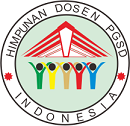THE IMPACT OF DIGITAL LEARNING LICENSES ON ACCESS TO EDUCATION IN PRIMARY SCHOOLS: A LITERATURE REVIEW
Abstract
This research aims to analyze and identify various previous research results related to the impact of digital learning licenses on access to education in elementary schools. This research is qualitative research using a literature review approach. The data used in this research are scientific articles and journals that are relevant to the research topic. The data sources selected include research published within the last 5 years, which discusses issues related to digital learning licensing, educational access, and technology implementation at the basic education level. The data collection technique used is through academic databases such as Google Scholar, JSTOR, ProQuest, and so on. By using keywords such as "digital learning license", "digital education access", "educational technology in primary schools". The data was analyzed qualitatively with stages of data reduction, data presentation, and drawing conclusions. Based on the research results, it is known that digital learning licenses, both open and paid, have a significant impact on access to education in elementary schools. Open licenses provide broader access and more affordable costs, while paid licenses, although offering more advanced features, often limit access especially in schools with limited budgets. Infrastructure challenges and economic disparities remain major inhibiting factors in harnessing the potential of digital learning technology. Therefore, efforts to increase access to digital education must include investments in infrastructure as well as policies that support the use of open licenses and technology based learning throughout elementary schools.
Keywords
Full Text:
PDFReferences
Abulibdeh, A., Zaidan, E., & Abulibdeh, R. (2024). Navigating the confluence of artificial intelligence and education for sustainable development in the era of industry 4.0: Challenges, opportunities, and ethical dimensions. Journal of Cleaner Production, 140527.
Adil, HM, Ali, S., Sultan, M., Ashiq, M., & Rafiq, M. (2024). Open education resources' benefits and challenges in the academic world: a systematic review. Global Knowledge, Memory and Communication,73(3), 274-291.
Alenezi, M. (2023). Digital Learning And Digital Institutions In Higher Education. Education Sciences,13(1), 88.
Azzahra, SI, Elmumtaza, S., Saniyyah, Z., Izzatunnisa, S., Azizi, MM, Jasmine, AS, ... & Khasanah, RAN (2024). Digital Learning Innovation: Language Collaboration In Tanjungmojo Village. Journal of Social Service, 1(11), 1897-1911.
Belay, M.T., Khatete, D.W., & Mugo, B.C. (2020). Availability of ICT resources for teaching and learning Biology in secondary schools in the Southern Region, Eritrea. International Journal of Technology and Systems, 5(1), 1-17.
Choksi, M. Z., & Grimmelmann, J. (2024). How Licenses Learn. Forthcoming, Lewis & Clark Law Review, 28(2).
Das, N. (2023). Digital education as an integral part of a smart and intelligent city: a short review. Digital learning based education: transcending physical barriers, 81-96.
Ferri, F., Grifoni, P., & Guzzo, T. (2020). Online learning and emergency remote teaching: Opportunities and challenges in emergency situations. Societies,10(4), 86.
Ferullo, D. L., & Buttler, D. K. (2023). Copyright: Best Practices for Academic Libraries. Rowman & Littlefield.
Gatkal, N.R., Nalawade, S.M., Sahni, R.K., Bhanage, G.B., Walunj, A.A., Kadam, P.B., & Ali, M. (2024). Review of IoT and electronics enabled smart agriculture. International Journal of Agricultural and Biological Engineering,17(5), 1-14.
Gusenbauer, M., & Haddaway, N. R. (2020). Which academic search systems are suitable for systematic reviews or meta-analyses? Evaluating retrieval qualities of Google Scholar, PubMed, and 26 other resources. Research synthesis methods,11(2), 181-217.
Haleem, A., Javaid, M., Qadri, M.A., & Suman, R. (2022). Understanding the role of digital technologies in education: A review. Sustainable operations and computers,3, 275-285.
Khosyiin, MI, & Khoiiri, MY (2024). Application of Digital Technology in Improving Learning Effectiveness in Islamic Education. Sasana: Journal of Islamic Religious Education,3(1), 137-142.
Komljenovic, J. (2021). The rise of education rentiers: digital platforms, digital data and rents. Learning, Media and Technology, 46(3), 320-332.
Mohzana, M., Murcahyanto, H., Fahrurrozi, M., & Supriadi, YN (2023). Optimization of management of laboratory facilities in the process of learning science at high school. Journal of Science Education Research, 9(10), 8226-8234.
Mwangi, J. (2024). Relationship between Education Funding Allocation and Academic Achievement Disparities. American Journal of Public Policy and Administration, 9(2), 37-47.
Neumeyer, X., Santos, S.C., & Morris, M.H. (2020). Overcoming barriers to technology adoption when fostering entrepreneurship among the poor: The role of technology and digital literacy. IEEE Transactions on Engineering Management,68(6), 1605-1618.
Rahman, KR, Shitol, SK, Islam, MS, Iftekhar, KT, & Saha, P. (2023). Use of metaverse technology in education domain. Journal of Metaverse,3(1), 79-86.
Rodriguez Abitia, G., Martinez Perez, S., Ramirez Montoya, MS, & Lopez Caudana, E. (2020). Digital gap in universities and challenges for quality education: A diagnostic study in Mexico and Spain. Sustainability,12(21), 9069.
Sanger, C.S. (2020). Inclusive pedagogy and universal design approaches for diverse learning environments. Diversity and inclusion in global higher education: Lessons from across Asia, 31-71.
Shadmi, E., Chen, Y., Dourado, I., Faran-Perach, I., Furler, J., Hangoma, P., ... & Willems, S. (2020). Health equity and COVID-19: global perspectives. International journal for equity in health,19, 1-16.
Siregar, RA, Raja, FD, Purnawarman, P., & Damayanti, IL (2024). The Lonely Journey of EFL Pre-Service Teachers in Remote Areas: Readiness and Challenges in Integrating ICT in Teaching. Teaching English with Technology, 24(1), 59-78.
Varkey, T.C., Varkey, J.A., Ding, J.B., Varkey, P.K., Zeitler, C., Nguyen, A.M., ... & Thomas, C.R. (2023). Asynchronous learning: a general review of best practices for the 21st century. Journal of Research in Innovative Teaching & Learning, 16(1), 4-16.
DOI: https://doi.org/10.24114/sejpgsd.v14i4.65372
Article Metrics
Abstract view : 33 timesPDF - 15 times
Refbacks
- There are currently no refbacks.
School Education Journal PGSD FIP UNIMED
School Education Journal PGSD FIP UNIMED is licensed under a Creative Commons Attribution 4.0 International License.










.png)
